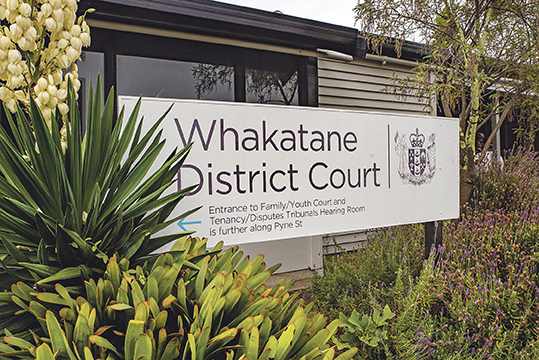Assault at Waihau Bay - man convicted

.
A Waikato man was convicted on charges of assault with intent to injure and strangulation in the Whakatāne District Court on Thursday after a visit to Waihau Bay ended in an altercation with his female cousin.
At a trial before Judge Paul Geoghegan, Caine Punakai was adamant he had only slapped the complainant with an open hand.
The complainant was his female cousin, who he was staying with in her pod cabin with a long-drop toilet on council reserve land in Waihau Bay, which she described as whānau land that had been confiscated by the Government.
The case pertained to an incident that occurred at her cabin on October 8, last year. Over several hours, the court heard two differing stories, one from the defendant Caine Punakai, and one from the complainant, who had driven Punakai to Waihau Bay after she had been visiting family in Huntly.
Punakai wanted to return to Huntly on the date of the incident but the complainant refused to take him. During her court testimony, the complainant said Punakai became persistent and aggressive about needing to return to Huntly.
She was tearful as she told the court that, as she sat on the bed of the cabin, he performed what she described as a “running knee” in which he ran toward her from across the cabin and kneed her in the head. She said he punched her twice more and headbutted her causing her to fall back on the bed where she tried to defend herself from a rain of further punches.
After escaping the room through sliding doors she said she got into her car, which had the windows rolled down and tried to drive away.
She said Punakai reached through the window to repeatedly push the start button to turn the car off to prevent her from driving away, punched her several more times and pulled on her arm, shoulder and neck trying to pull her out of the car.
She described being grabbed around the neck with a two- handed grip which restricted her breathing, saying this was made worse by her previously have had a thyroid operation. She reported feeling short of breath and dizzy for two-to-three minutes.
She said at some point she was able to get out of the passenger door of the car and run to a neighbouring property where there were tradespeople working on renovation who she asked for help and to call police.
She then returned to the cabin to check on her belongings. No call to the police was made.
The next day she called an ambulance and drove to the ambulance bay in Te Kaha to meet it. The ambulance took her to Te Kaha doctors who referred her to Whakatāne Hospital where she was admitted and spoke to a police officer.
She said a nurse told her she had had a brain bleed and she had a ruptured shoulder, lumps to her head and a cut lip.
She said she had been kept in hospital for four days and had since suffered daily migraines, poor memory and poor balance.
After being released from hospital she made a brief return to the cabin to collect some person items than went to stay with family in Hamilton for several weeks. On return to her cabin she found it had been looted and her belonging taken.
The victim was cross-examined at length by Punakai’s lawyer Lisa Ebbers, who put it to her that she had been consuming alcohol, cannabis and methamphetamine before the incident, that she had been “up for days”, that she had been the one acting aggressively and that Mr Punakai was afraid of her and other people visiting her cabin.
Though she admitted to having used methamphetamine occasionally she denied having used it on the day of the incident. She said she had “smoked a cone” earlier that morning but was not affected by this at the time of the incident. She denied being the aggressor.
The police officer who interviewed the complainant at the hospital the next day said she was visibly upset and showed bruising on her arms and neck.
Judge Geoghegan said the medical records referred to minor bruising on both the complainants upper arms and both thighs, but there was no function limiting or disfiguring in terms of external injuries. Two CT scans showed that there were no acute head or neck injuries.She had been given pain medication and discharged the next day.
He said clinical notes refered to the complainant’s account of events which was broadly consistent with evidence given at the hearing.
He said the complainant gave her evidence in a “straight-forward and, to my mind, genuine manner”.
“The medical evidence is consistent with her account of events. I consider Punakai’s reference to slapping [the complainant] across the mouth to be carefully designed to minimise his involvement in the assault that actually occurred. I consider that the loss of control was considerably greater than that.”
He accepted the complainant’s testimony that she had been grabbed around the neck and punched.
I find the essential elements proved beyond reasonable doubt and Punakai is convicted accordingly.
Punakai, who had been in custody since February over the incident, will appear for sentencing on December 17.